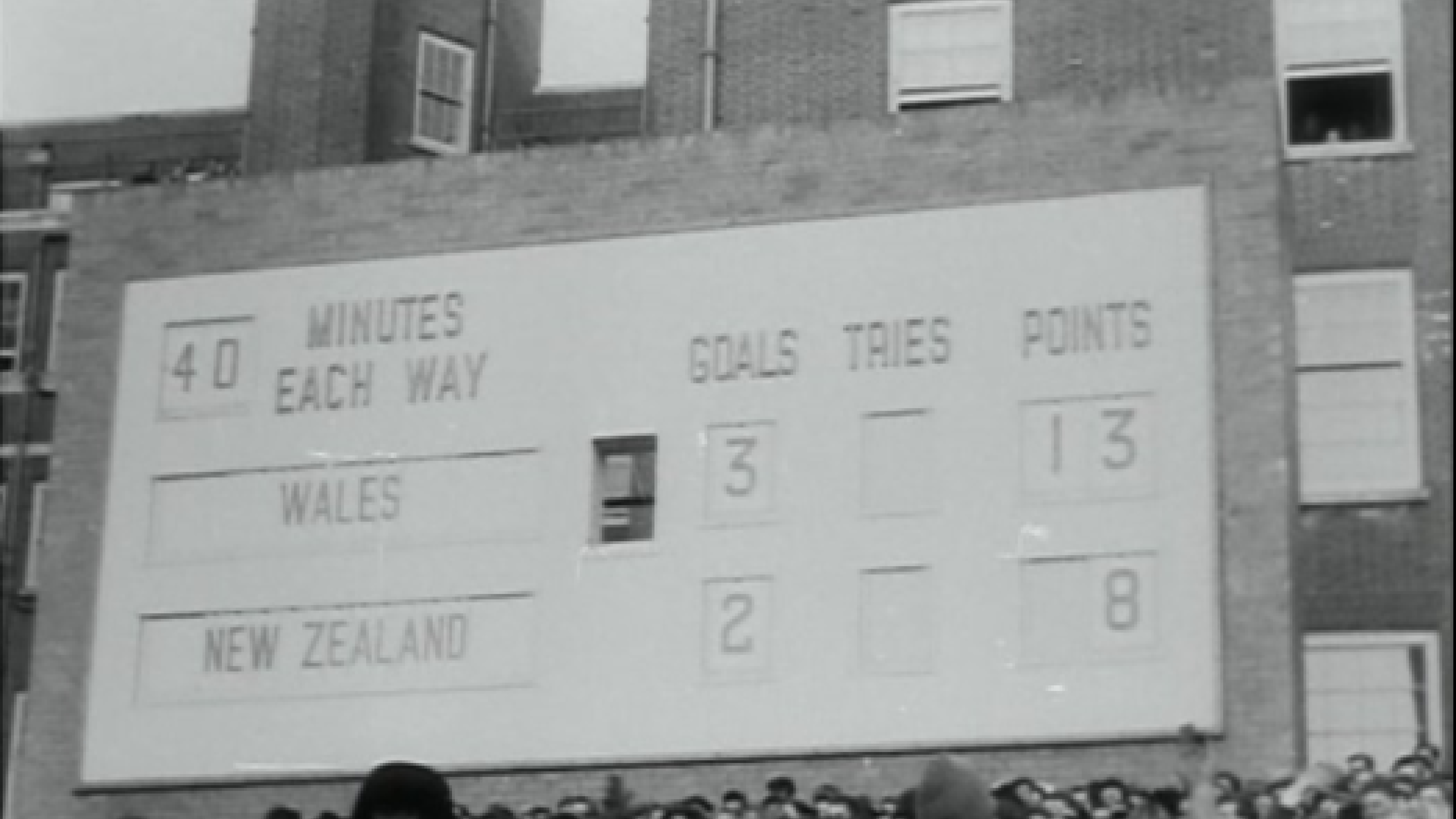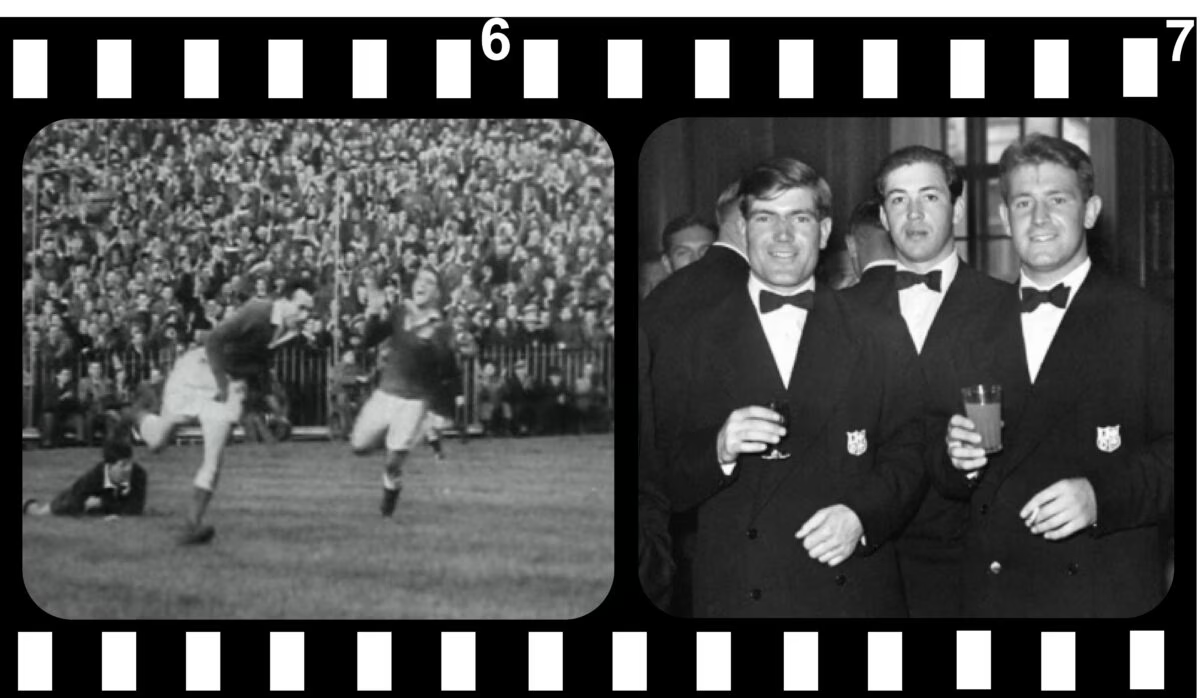We started the series with ‘I was there’, looking at great games between Wales and their autumn opponents, but as a slight twist we have a ‘My Dad was there’ view of the great 1953 clash between Wales and the All Blacks.
As pointed out by rugby historian Howard Evans in the opening piece in our new series, the Welsh victory over New Zealand in the year that the Queen came onto the throne was our last. In fact HRH Elizabeth II was a mere six months into her reign on 19 December, 1953, Sir Winston Churchill was Prime Minister, Frankie Laine was starting a three-week run at No 1 in the music charts with ‘Answer Me’ and a pint of beer was a mere 6p.
The first family link back to that day is provided by the current Scarlets director, Sean Fitzpatrick. The legendary New Zealand captain followed in the footsteps of his father, Brian, in wearing the All Blacks jersey. An inside centre, or second five eighth in Kiwi parlance, he made his international debut against Wales. His day didn’t work out as he wanted, but his son ensured there was plenty of revenge by winning all six games against Wales in his stellar 92-cap career.
“I always say, a little bit tongue-in-cheek, that dad never wanted to come back after that game in 1953. He was a proud man, and very proud to be an All Black, so he didn’t talk about it that much. What he did talk about was the No 525 – that was his number as an All Black.
“He became very good friends with Cliff Morgan, who he played against that day, and for years and years Cliff tried to get him to go back to Cardiff for the annual reunion of the Cardiff team that also beat New Zealand on that tour.

“But dad would say to me. ‘No bloody way son, I’m never going back to that bloody place’. And he never did. Even in 1989, when we toured here, my mum had to go by herself because dad wouldn’t go back to Wales.
“He would be turning in his grave if he knew I had joined a Welsh region – especially one that had beaten the All Blacks! I recently cycled around 53 clubs in the Scarlets region on a charity ride and, of course, 1953 was the year the All Blacks last lost to Wales. I wonder it that might just be an omen!”
The only surviving member of the 1953 All Blacks team that went down 13-8 is back row man Bill McCaw. A distant relative of the great double World Cup winning captain, Richie McCaw, he turned 94 on 26 August this year.
Playing against him was a future British & Irish Lion and Wales captain, Clem Thomas. It was a game in which he played a key role, yet the Swansea hard-man almost missed the biggest game of his life. His story was told by his eldest son, Chris, in a book he wrote about his father, ‘Clem’.
“Dad had been involved in a fatal car accident on the day before the game. He still wanted to play, everyone wanted him to play . . . except the Welsh selectors. They felt he might still be suffering from shock. One man talked and persuaded the reluctant Welsh selectors round – Bill Ramsay, the treasurer of the Rugby Football Union,” Chris wrote in the book.
WATCH A TRIBUTE TO CLEM THOMAS FROM HIS FAMILY
Imagine that, a high ranking official from another Union going into bat for a player from a different country. The ‘Big Five’, as the Welsh selectors were widely known, actually held a meeting at 12 noon on the day of the match to finalise their side because of their concerns over the back row.
Thomas played, but Glyn ‘Shorty’ Davies was forced to pull out and was replaced by the Cardiff flanker Sid Judd. Judd had scored against the tourists in Cardiff’s famous win over them earlier in the tour and struck again in the international.
“Clem had a prosaic view of New Zealand rugby. He loved their passion for the game and the all-embracing rugby culture that permeates parts of New Zealand society, but deep down he was always suspicious that there was too much emphasis placed on winning at all costs, that whilst he admired their physical intensity and frontier-like hardness to absorb physical pain, such singular attitudes could and did lead the All Blacks down dark corridors to achieve a win. Dad noticed in 1953 that New Zealanders can be bad losers. They drew 6-6 at Swansea and were then beaten by Wales. That led to a few cheap shots being thrown.”
Thomas’ moment of inspiration in the second half led to one of the most famous Welsh tries of all-time. Hemmed in on the left hand touchline, he cross-kicked towards the posts. The bounce was kind and the rest, as they say, is history.
THE TIMES – MONDAY, 21 NOVEMBER, 1953
The crowd, one cannot help thinking, would have been content with a draw, but not so the Welsh team. From now on they out-rushed their opponents even if they got the ball. It was the smothering of Elsom which offered R. C. C. Thomas his great chance. Gathering the ball on the left touchline, he had a quick look about him and saw that across the field spread a wide open space occupied by Ken Jones. Thomas placed his long kick across field well and it bounced nicely for Jones, whose speed and swerve easily beat his only opponent, Scott. Rowlands made no mistake with the kick and, for the last five remaining minutes, New Zealand were too shocked by the two blows which had suddenly befallen them to strike back in force.
Bleddyn Williams had faced the Al Blacks four times on the 1950 British & Irish Lions tour and led Cardiff to their famous victory over the 1953 tourists. He then played in the international against them as well.
“Club teams generally did better against touring teams than Wales. That was because players knew each other while international matches outside the Five Nations were few and far between. A touring side had a distinct advantage because of the time they had spent together but we were playing in front of 50,000-strong Welsh crowd,” he told Paul Rees of The Guardian.
“I cannot say I was surprised that we won, just the way we did: we were trailing 8-5 in the last 15 minutes, when the superior fitness of the All Blacks should have told, and our wing Gareth Griffiths was playing with a dislocated shoulder, while I had torn ligaments at the top of my thigh (he didn’t play for two months after the game).

“I was standing next to Clem Thomas and, if he had passed to me, I could have done nothing. It was the cleverest and quickest bit of thinking I had ever seen from a forward. The ball bounced in space and Ken Jones nipped in to score.”
It was often claimed that the Welsh touch judge that day, Ivor Jones, the former Llanelli, Wales and Lions back row forward, had shouted to Thomas to cross-kick moments before he performed his match-changing act. ‘Not true’ claims his son, Chris.
“Clem had done that before in a game in France while on tour with Cambridge University. He never mentioned the fact that Ivor Jones had called out to him. It was simply an instinctive action that reaped rich rewards,” said Chris.
The match-ball from that famous day became a major trophy, as The Times recorded at the end of their match report.
The last incident of note came after ‘no-side’, when Bob Scott and Roy John made a dive for the ball as a relic. The latter got there first, but gallantly gave it up to New Zealand’s greatest player.
If anyone knows where the ball is today then the Welsh Rugby Union would love to know. Maybe we could have it back to put alongside the 1905 ball that has survived from the first game played between the two teams.

